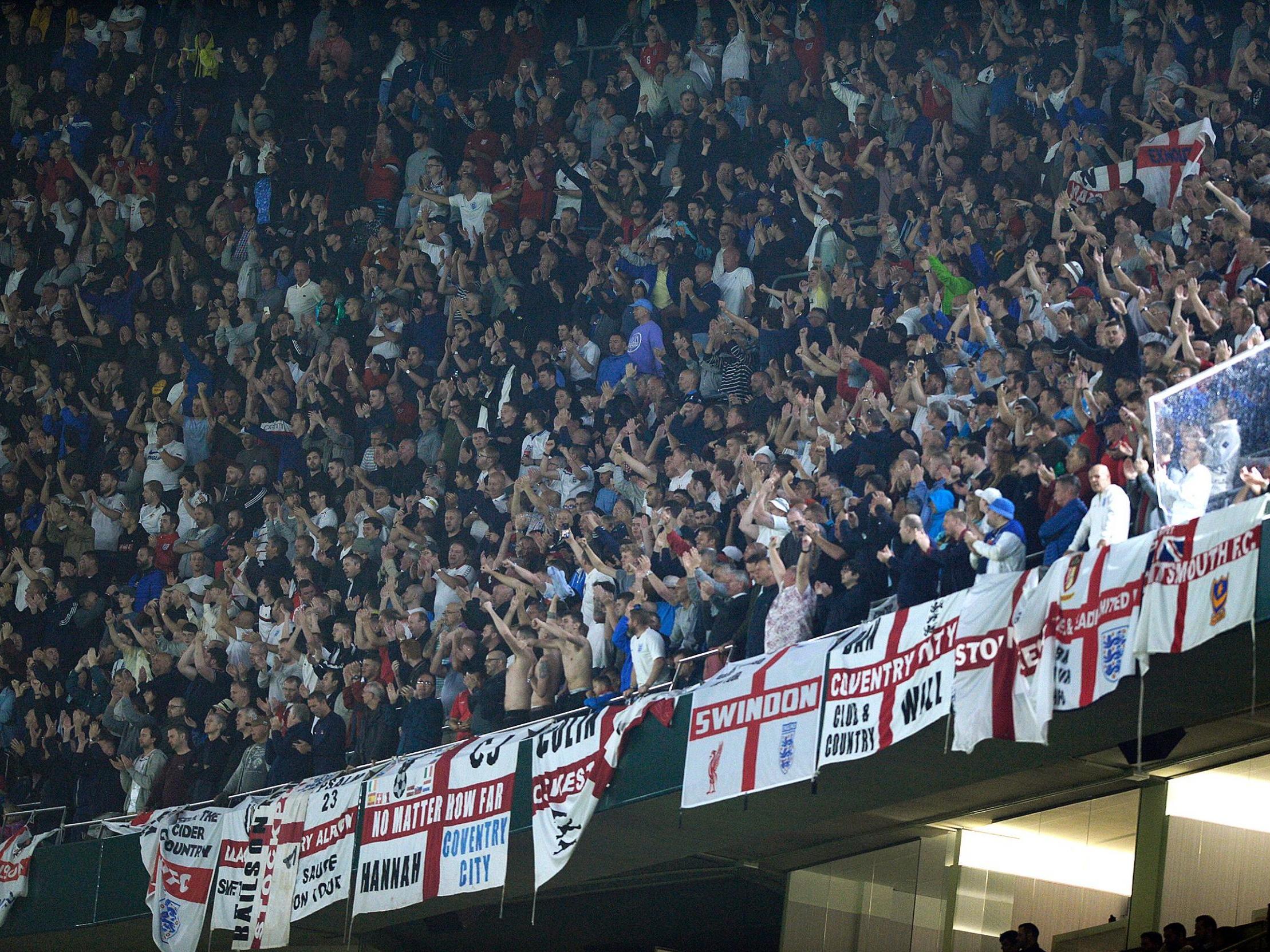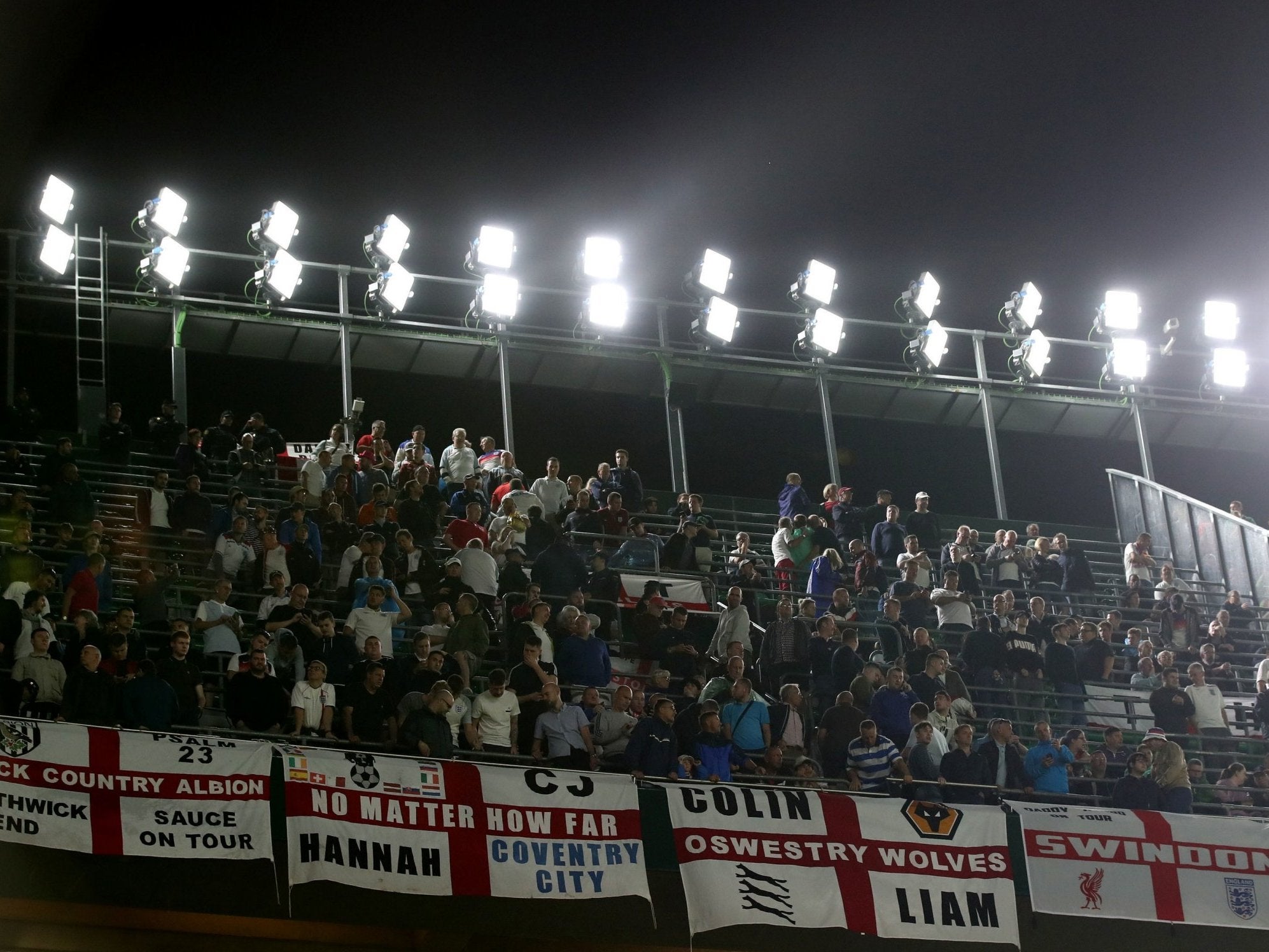When England play overseas, it is always the voice of the angry, white, male racist that shouts loudest
The behaviour of so many of England fans abroad is no accident. It is not at odds with our national character but entirely at one with it: insular, arrogant, confrontational, territorial

Your support helps us to tell the story
From reproductive rights to climate change to Big Tech, The Independent is on the ground when the story is developing. Whether it's investigating the financials of Elon Musk's pro-Trump PAC or producing our latest documentary, 'The A Word', which shines a light on the American women fighting for reproductive rights, we know how important it is to parse out the facts from the messaging.
At such a critical moment in US history, we need reporters on the ground. Your donation allows us to keep sending journalists to speak to both sides of the story.
The Independent is trusted by Americans across the entire political spectrum. And unlike many other quality news outlets, we choose not to lock Americans out of our reporting and analysis with paywalls. We believe quality journalism should be available to everyone, paid for by those who can afford it.
Your support makes all the difference.Monday night was the best performance by an England football team for a generation, a display of unprecedented intelligence, bravery, ruthlessness and teamwork to dismantle one of the best teams in the world. And yet to spend time with some of the fans following England was to have any sense of pride coloured by shame.
What leaves the deepest mark is not the low-level bad behaviour, the littering, the vandalism or the noise. It is the tragic attempts of a new cohort of fans to redraw the English football nation on narrow religious and racial grounds.
That is the clear implication of how so many of the England travelling fans speak and sing about the national team. Not all of them, of course. It was notable how much better England fans behaved at the World Cup in Russia, when there were fewer of them, but they were the regular home-and-away England contingent. More interested in loyally following the team than in causing trouble.
But when England play in Europe, the atmosphere changes. There are thousands of fans who treat these games as their chance to stage their own little invasion of Europe, playing out their D-Day fantasies. Annex a corner of a foreign town. Flags up. 10 pints. Hope that someone objects to their objectionable behaviour, just to provide the pretext for their own reaction and escalation. That was the story in Seville late on Sunday night, just as it was in Amsterdam, Dortmund, or across France in Euro 2016.
Among the flags attached on Monday afternoon to the O’Neill’s pub, next to Seville’s historic bullring, one stood out. An orange flag that had a Blackpool FC badge, a Three Lions crest, and at its centre the letters ‘FLA’, the logo of the ‘Football Lads Alliance’. The FLA is an Islamophobic group whose selling point is that whatever differences may exist between the fans of rival football clubs, they can all come together to demonise Muslims.
“By calling themselves the ‘Football Lads Alliance’ they have tried to legitimise their hatred and prejudice, because people think it’s about football,” says Qari Asim, chair of the Mosques & Imams National Advisory Board. “But the rhetoric that comes out of them, and their visible attacks on ethnic minorities, is quite staggering. There is no doubt about the fact they are Islamophobic. They distort Islam and exploit national political issues by perpetuating fear and a sense that Sharia is going to take over the country.”
For that FLA flag to fly among a big group of England fans in Seville, and for nothing to be done about it, says a lot about the unwillingness of fans to self-police these issues. And how relaxed many that follow England are about incubating racism and discrimination amongst themselves.
Just as shaming in Seville on Monday afternoon was the number of England fans who decided that they wanted to define themselves as being against the Irish, and against Roman Catholics. Shouts of “No surrender” between the third and fourth lines of the national anthem have become depressingly frequent at England games. They are just as loud as the rest of the anthem, undermining the claim that sectarianism is only the preserve of a “tiny minority” of the England travelling support.

There is an obsession with Northern Ireland and The Troubles, as shown by the widespread chanting of “F*** the IRA”. What stands out is that those singing are not veterans of the 1980s and 1990s, whose formative years were when this was the dominant issue in British national life. These are English youngsters, born around the time of the Good Friday Agreement, growing up in a time when Northern Ireland was fading away as an issue. And at the time of their lives when they choose who they identify with, and who they identify against, this is what they have chosen.
That explains the worst of all England songs heard in Seville this week, in the bars on Sunday night, and on the walk to the ground on Monday evening. It is made up of three words: “F*** the Pope”. As if we have dredged up the logic of Henry VIII and Elizabeth I, and decided that this is how we must organise ourselves now. Draw a line in the sand: English on this side, Catholics on the other.
Consider that for as long as you need to and then think what it implies for Britain’s other ethnic minority communities. If enough travelling England fans are happy to pull up the drawbridge, and make clear that they see Muslims and Catholics as being on the other side of the moat, then what of the other communities whose families have moved to Britain over the last century?
There is a sad irony here which is that part of World Cup success was the triumph of the diversity of the England team, and the genuinely unifying effect their run to the semi-finals had on all parts of the country at home. In a country that is increasingly fractious, each part estranged from the other, Gareth Southgate’s team did more to bring people together than any other cultural force of recent years.
And yet of all the different groups and voices shouting at home, when England play away, just one voice is heard over all the others. That voice is white, male, aggressive, and desperate to be challenged just so it can take offence. It is the unavoidable undertone of every English trip abroad.

The easy, lazy option is to argue that the vandals and racists are not “true England fans” – whatever that means – and that they do not represent the rest of the country. That if the Football Association and the police could just pluck out the few bad apples then the rest of the barrel would be clean. Another more convincing theory is that you could ban every fan who was here in Seville and the make-up and behaviour of the next England away contingent would not be very different.
Because we all know inside ourselves that the behaviour of so many of England’s fans abroad is no aberration and no accident. It is not at odds with our national character and mood but entirely at one with it: insular, arrogant, confrontational, territorial, unable to see anything through the eyes of anyone else, suspicious of minorities and foreigners, increasingly dependent on national myths and purity tests. Do not be too surprised by the behaviour in Seville. Just turn on the news.
Join our commenting forum
Join thought-provoking conversations, follow other Independent readers and see their replies
Comments